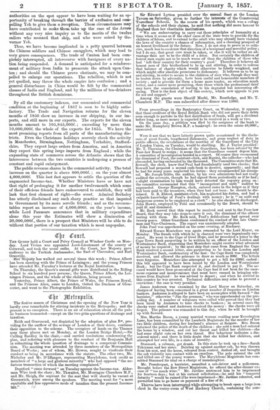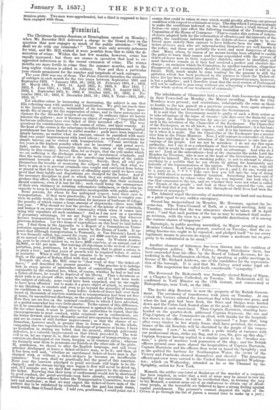f4t • 31Ittro31ulio.
The festive season of Christmas and the opening of the New Year is hardly ever remarkable for stirring incidents in the Metropolis ; and the present is no exception. There is an air of relaxation about all the public business transacted—except on the two grim questions of drainage and taxation.
Erith and Gravesend, not dispirited by the adoption of plan B*, providing for the outflow of the sewage of London at their doors, continue their opposition to the scheme. The occupiers of lands on the Thames near those places met on Monday, at the London Bridge Hotel,—Sir Culling Eardley in the chair,—and carried resolutions condemning the plan, and referring with pleasure to the conduct of Sir Benjamin Hall in submitting the whole question of drainage to a competent Commission. The meeting was attended by throe members of the Metropolitan Board of Works ; one of whom, Mr. Howes, sought to vindicate their conduct as being in accordance with the statute. The other two, Mr. Nicholay and Mr. D'Iffanger, representing Marylebone, took credit as members of "a large and glorious minority" who had opposed "the nefarious transaction of which the meeting complained."
Deptford "came forward" on Tuesday against the Income-tax. Alderman Wire took the chair; Mr. Thwaites, Mr. Montague Chambers M.P., and Mr. Sleigh, the aspirant for the seat that will shortly be vacant at Greenwich, Were among the speakers. The meeting went for "a more equitable and less oppressive mode of taxation than the present Incometax:, Sir Edward Lytton presided Over the annual feast at the London Tavern on Saturday, given to further the interests of the Commercial Travellers' Schools. In the course of his speech, which was a eulogy of the schools and their claims, he said that nothing did more honour to England than her charitable institution& "We are endeavouring to carry out those principles of humanity at a time when it seems as if the chief cares of the state were to provide for the children of felons, and to extend to the adult who may already have violated the laws of the country a chance of reformation, and a cheering prospect of an honest livelihood in the future. Now, I do not stop to prove or to criticize, much less to condemn that direction of a benignant and merciful policy ; but I do say, that great care must be taken, or else it will be rather an advantage than not to be the child of a felon. But certainly the children of honest men ought not to be much worse off than the children of those who had left their country for their country's good.' Therefore it behoves all honest men of this brotherhood to be up and stirring, in order to redress that balance of charity which would otherwise be falsely weighted, and which might offer absolute premiums to dishonesty. It behoves us to be up and stirring, in order to secure to the children of men who, though they may be beaten down by adversity, have been useful and honourable members of society ; and to provide for them a home more tender, an education much better, and a career more promising, than those which the professional thief may have the consolation of leaving to his degraded but interesting offspring. That is the first object of this society, which now appeals to you for aid and support." Among the guests were Sheriff Itechi, Mr. Routledge, and Mr. T. Chambers M.P. The sum subscribed after dinner was 1500/.
From proceedings in the Bankruptcy, Court, on Wednesday, it appears that those creditors of the Royal British Bank who did not prove their debts soon enough to partake in the first distribution of funds, will get a dividend before long, as more money is expected to be received in a week or two.
On the same day, a petition was filed by the assignees of the bank to make Mr. Humphrey Brown M.P. a bankrupt : he owes the estate 40,0001., unsecured.
Were it not that we have latterly grown quite accustomed to the disclosure of great frauds, lengthened dishonesty, and gross neglect of duty in public officers, the revelations at the meeting of the Guardians of the City of London Union, on Tuesday, would be startling. Mr. J. Taylor presided : Mr. T. Thornton, the Chairman of the Guardians, has been advised by the Poor-law Board to resign : it seems that the Guardians cannot depose him. A committee of investigation handed in a report. Of course they recommend the dismissal of Paul, the assistant-clerk, and Manini, the collector—who had absconded, having embezzled by the thousand. The Committee state that Mr. Rowsell, the clerk, knew that Paul had fraudulently used two checks•, that Rowed ll had prepared a second cash-book to deceive, apparently ; and that he had for many years neglected his duties : they recommended his dismissal. Mr. Joseph. Gibbs, the auditor, by his own admissions had not really audited the accounts, though he had signed them periodically as if he had ; a slight examination by him would have detected the roguery going on : the committee recommend that this "incompetent and unfit " auditor be superseded. George Hampton, clerk, entered sums in the ledger as if they had been paid to the treasurer, when they had not been: he should be dismissed. G. B. Eldred, assistant-clerk, has neglected his duties, and had a culpable knowledge of Paul's dealings with money ; he is "an unfit and dangerous person to be employed as a clerk" : he also should be discharged. John Hawse, employed by Pauland occasionally by the Board, should be paid Si. and dismissed. Mr. Rock moved that this report be received and sent to the Poor-law Board, that they may take steps to carry it out, the dismissal of the officers resting with them. Mr. Rock said, Paul's defalcations had spread over twenty years. Other Guardians condemned the conduct of the late Chairman and Vice-Chairman. The report was unanimously adopted.
John Paul was apprehended on the same evening, at Hackney.
Edward Horace Montefiore was again remanded by the Lord Mayor, on Monday. The frauds with which he is charged were very ingeniously executed. He went to the Cape of Good Hope, and he presented a letter to the Cape Town Bank purporting to be written by an officer of the London and Westminster Bank, requesting that Montefiore might receive what advances of money he required; by the next ship that came from England the Cape Bank received a second letter, also purporting to be from the London and Westminster Bank, confirmatory of the first : the Cape Bank was completely deceived, and allowed the prisoner to draw as much as 800/. The letters were forgeries. Montefiore also attempted to get a bill for 53001. cashed : this bill appeared to have been issued by the London and Westminster Bank ; but the Cape Bank suspected it, and declined to pay it. The accused would have been prosecuted at the Cape had it not been for the enormous expense and inconvenience that must have ensued in bringing witnesses from England : he was advised to depart ; and when he arrived in this country he was arrested. Technical difficulties may arise to prevent a conviction : the case is very peculiar.
James Anderson was examined by the Lord Mayor on Saturday, on charges of having been concerned in a great number of forgeries on London bankers. Anderson is alleged to have been an accomplice with Seward "the barrister," otherwise "Jim the penman," who was apprehended on the preceding day. A number of witnesses were called who proved that they had been hired by Anderson to take checks to bankers ; in several cases the cheeks were cashed and Anderson received the money : the checks were all forged. The prisoner was remanded to this day, when he will be brought up with Seward.
Mrs. Martha Bacon, a young married woman residing near Kennington Lane, has been committed by the Lambeth Magistrate for the murder of her two little children, during her husband's absence at Reigate. Mrs. Bacon informed the police of the death of the children : she said a man had entered the house by a window, and cut her throat and killed her children—she had some slight cuts on her own throat. Her behaviour indicates a disordered mind; and there is little doubt that she killed her children, and attempted her own life, in a state of insanity.
Stannard, a cabman, got drunk. In this state he took up a fare—Sarah Tideyman and her sister. Driving up against another cab, he was thrown from his seat, and the horse, released from control, dashed off, and brought the cab violently into contact with an omnibus. The pole entered the cab and killed one of the young women. The Marylebone Magistrate has committed Stannard Mr trial on a charge of manslaughter.
Mr. Prendergast, a banister, assaulted a cab-driver and a policeman. Brought before the Bow Street Magistrate, he offered the after-dinner excuse of "too much wine." Mr. Jardine sentenced him to be imprisoned for fourteen days ; but at his earnest solicitation—he said his "temporal futurity" would be ruined if he were imprisoned—Mr. Jardine relented, and permitted him to go home on payment of a fine of Si.
Thieves have been interrupted while attempting to break open a large iron
chest in the vestry-room of West Hackney Church, containing the tom
munion-plate. Two men were apprehended, but a third is supposed to have been engaged with them.

































 Previous page
Previous page